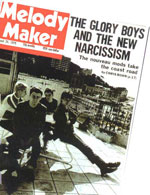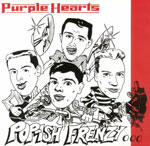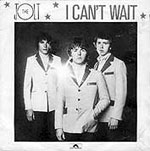
The Purple Hearts were part of a grassroots mod resurgence at the end of the ‘70s. They were one of a handful of great groups associated with an organically grown scene that was essentially a reaction to an emerging punk orthodoxy. The new generation of mods, inspired initially by The Clash, The Jam, and Buzzcocks, got its clothes and ideas from the rubbish bins, other people’s quality cast-offs. A discarded copy of George Melly’s Revolt Into Style, old ‘60s french film yearbooks, secondhand sta-prests, a three-button hand-me-down, charity shop Crombies, copies of Small Faces and Zombies compilations from the bargain racks, the booklet ripped out of The Who’s Quadrophenia, jumpers from the school outfitters’ sale, scratched soul 7”s, and unloved hush puppies. The mods’ magpie mentality lived on.
There was a kind of mod continuum, a British r’n’b tradition, from the ‘60s through The Creation, Downliners Sect, Pretty Things and Poets, through to Third World War, Jook and Hammersmith Gorillas, and on to Dr Feelgood and Count Bishops in the mid-‘70s. It’s a completely primitive thing. Stripped-down staccato sounds, a suppressed savagery. And like a Mickey Spillane Mike Hammer story, it may not be particularly pleasant, but it’s astonishingly effective.
Central to all of this somehow is the Rock On stall started by Ted Carroll and Roger Armstrong in Shepherd’s Bush, later moving onto Soho Market, selling old Sue singles, rockabilly, blues, and ‘60s r’n’b experiments, acting as a magnet for the displaced pre-punk and beyond. When I went there Shane McGowan was working behind the counter, and we’d buy fanzines like Safe As Milk, Damaged Goods, Maximum Speed to read about the Gang of Four, Delta 5, Purple Hearts and Alternative TV. Shane would go on to record 'Gabrielle', one of the great London songs, with The Nips, where he’d sing about taking “the 73 to the City, you sitting there looking so pretty, and though you never once gave it away I can still remember those crazy days, in the old West End we’d go dancing.”

The Purple Hearts embraced a lot of this, but were a thoroughly modern pop group. “We’re the gap between art and life,” they quipped, and played up the pop art connections, peppering interviews and songs with steals from Lucy R Lippard’s book on the subject, and from Gary Herman’s book on The Who. Their records sound fantastic still, and credit must go to Chris Parry for capturing the sound raw. The Purple Hearts had the songs. They were punchy, pungent numbers, mini kitchen-sink dramas, very grainy and argumentative, all about not fitting in, not giving in, performed brashly and boldly, with Stebbing jabbing and clanging away, and Manton very much the star. For Parry’s Fiction label they made three great singles, as good as ATV’s 'Action Time Vision', and the essential Beat That! LP, and it was all nearly over in next to no time.
Their closest comrades were The Chords, who similarly burned briefly but brightly. The Chords had similarly been scouring the markets, putting together their own variation on the mod thing, and the look and sound was very much their own. Like the Purple Hearts they roared out of nowhere, and found themselves back there incredibly quickly. But again they left behind a small set of timeless recordings. The best of these is 'Maybe Tomorrow', a completely over-the-top cacophony of crashing guitars and urgent vocals, a warning of everyday dangers, and how prophetically it’s “too late to take the Underground”. The Chords too had a charismatic lead singer in Billy Hassett, and a gifted songwriter in Chris Pope, who could put together powerful and purposeful numbers about real life that snap and snarl and sulk with the best of them.

The Purple Hearts at their boldest and brashest are captured on the Rough Cut and Ready Dubbed documentary, and it’s appropriate that being so self-assured they recorded a cover of David Bowie’s beat-hymn to narcissism, 'Can’t Help Thinking About Me', which was later recorded by Mark Stewart too. But when fortune bit back hard and things got a bit messy the Purple Hearts became rather more interesting and strange, incorporating all sorts of psychedelic traces, rather like their mod antecedents The Action. And while they were still so much younger than peers like Joy Division and The Teardrop Explodes the Purple Hearts pretty much called it a day, resurfacing only occasionally. One of those occasions was to record the Pop-ish Frenzy set, and while the world wouldn’t listen some lads in Manchester were taking notes.
© 2006 John Carney
*Sleeve NotesSIDE ONE but not one sided, not this platter; no siree. Kicking off with FRIENDS AGAIN and aren’t you glad we are running hand in hand with your loved one across the eternal filmset of life wow! WHEN I SEE YOU my heart plays Giant Steps by trane at least, boy meets girl and hope she makes my day. CALL OF THE WILD the past is red and the streets are paved with Philip K Dick in this future past tale of massive proportions. I’LL MAKE YOU MINE Written just after Winston O Boogie met the termination of his temperol and I wasn’t even in love GET OUT OF MY LIFE WOMAN But please leave your James Brown and Lee Dorsey records when you go baby.
SIDE THE SECOND HI BABY why don’t we ever say what comes into our minds, and if I do will I blow my cool, my stack, my chance of salvation at the feet of woman. SHELLSHOCK Woke up this morning and walked through those doors of aware-ness and there’s no turning back. Angels yes BUT ON SUNDAY Put the kettle on, hancock’s half hour, church bells ringing, ah sweet suburbia. I CAN’T DREAM Do you dream in colour and why should life be grey when you can make it multi coloured exploding like Dylan’s consciousness. GUN OF LIFE And it’s head on grand finale time and while we’re at it let’s expose the macho myth for what it is. Women aren’t objects and Zola was right … Goodnight
R J Manton 7/5/86 12.58 AM